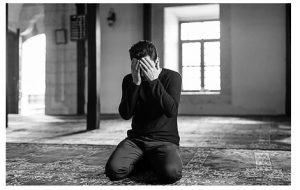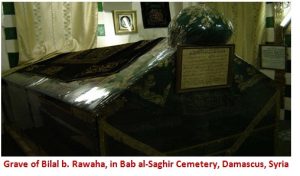Bilal, the Outrunner (Part-10)

Beginning with the previous eight issues of Young Muslim Digest, the life of Bilal bin Rawaha, the famous Companion of the Prophet, is being serialized in this column every month. Presented herein under is the tenth installment in this series taken from the brief, but significant, biography by SYED IQBAL ZAHEER.
Therefore, we find Bilal next at the Syrian front. The mujahideen everywhere must have felt proud to have him with them. It was no ordinary thing for them to have at their side one of the first converts to Islam, a life‑long Companion of the Prophet, his personal secretary, the standard bearer, treasurer and executive and, a muedhdhin of a mosque of which the Imam was Muhammad!
Obviously there would be no giving in to the enemy when they had a person of Bilal’s stature among them. Bilal was also there, as specifically stated by Tabari in his History, at the fall of Hims (or Homs). There were many Companions in the battle‑field with them. But Bilal with his tall, slender and slightly stooping figure, clad in the majestic shroud of modesty, would have stood distinct. Though it is another thing that the war days are not time for people to gather in a tent, sip tea and listen to gossip. War times are times of death, injuries, cries of the maimed, and, overhaul of the arms for next day’s battle. Bilal couldn’t have been given the attention they would have wished.
Nevertheless, honored by men and honored by God, Bilal used to say of himself, especially when people spoke of his virtues before him: “I am only a Negro who was a slave until yesterday!” How close was Bilal to the Prophet who had said: “I’m but a man born of a woman that used to eat bread made from course flour.”
But what is worthy of note is that despite his self‑effacement, Bilal wasn’t unaware of his place in Islam or among the Muslims. He accepted it just as another fact of life. When `Umar (ra) sent his representative to make inquiries about the conduct of the famous commander, Khalid ibn al‑Waleed, but the Commander‑in‑Chief, Abu `Ubaydah, as well as the representative himself who was sent with the orders, felt some discomfort at beginning the inquiry, it was Bilal who came forward and removed the turban from the head of the lion, the Sword of Allah, Khalid ibn al‑Waleed, in front of the multitudes – for the enquiry to begin. No one could dare do it when the Commander‑in‑Chief himself felt diffident.
It is said that Abu `Ubaydah had actually concealed the first letter of `Umar in an effort to delay the inquiry. But `Umar wrote to him a second time asking him to take action. And the action involved de‑officiating Khalid from the post of a Commander, conducting the enquiry and reinstalling him, if found innocent.
Further, if Bilal, on his own, without anyone inviting him, thought it fit to take the initiative, who in the world would have had the courage to restrain him?
Yet modesty was there, through and through. It never left him. For it was not the modesty of an artificial man, nor an acquired trait. In Bilal, modesty had found a human form. Hence, when the enquiry proved Khalid innocent, it was Bilal again who restored his headgear saying: “We respect our leaders and obey them.” (Al‑Bidaya wa al‑Nihaya)
When `Umar toured the Syrian region in the sixteenth year after hijrah, Bilal was there to meet him at the town of Jabiyah. From there on, they travelled together to Bayt al-Maqdis. It was either in Jabiyah or in Jerusalem that people asked `Umar to ask Bilal to call for the Prayers. Bilal said, “I had promised myself that I would not call for Prayers after the Prophet. Nevertheless, today I shall do it for you.”
He rose up and began to call in the manner he used to in Madinah … in the same soft tone and in the same melodious, heart‑piercing voice.
The call brought back memories of the Prophet’s time. `Umar was deeply moved. Tears began rolling down his cheeks. He wept so hard, although such a strong man, that it caused him hiccups. None of the other Companions that were present, such as Abu `Ubayda and Mu`adh b. Jabal or others could hold back the tears that wetted their graying beards. (Ibn Sa`d. The incident is widely reported)
These were strong men who had subdued a third of the then known world. When they fell upon an enemy, they fell like lions upon gazelles, scattering them in all direction. Yet here they were, crying like children!
 The two, toughness and softness of the heart seem, to many, conflicting qualities. But not in a believer. For his personality is composed of layer upon layer of qualities. Each layer has its bank of qualities that he draws from while dealing with different situations. A believer is capable of reconciling many irreconcilables.
The two, toughness and softness of the heart seem, to many, conflicting qualities. But not in a believer. For his personality is composed of layer upon layer of qualities. Each layer has its bank of qualities that he draws from while dealing with different situations. A believer is capable of reconciling many irreconcilables.
As for the ability to cry … it comes from a tender heart and is the very sign of faith. If, under the influence of unbelievers, or due to hardness of their hearts, Muslims have also begun to believe that to cry is a weakness, and one comes across those that appear very religious and scholarly but are incapable of crying, while the Prophet has promised Paradise to him who remembers Allah (swt) when alone, and the remembrance brings tears to his eyes … if that is so, then it is not for the heavens to cry at the loss of the humans.
That was one Adhan of Bilal in Syria. But it had a long‑lasting effect. Waleed used to say: “To this day the Adhan of the Syrian Muslims is of the same style as the Adhan of Bilal.” (Siyer A`lam al‑Nubala’)
A Quiet Life
Bilal had gone to Syria primarily for Jihad, but, with time, he took to liking this historical land of Prophets. When the Syrian conquests were over, he decided to stay back, and when `Umar visited the area, he requested him that he and Abu Ruwayha be allowed to remain there.
Probably it was after he had settled in Syria that people gradually began to know him. Some families were keen to create matrimonial alliance with him. So it was no problem for Bilal to get married a second time, although we do not know what happened to the first wife as to whether she was then alive or not. There are some reports that speak of a third marriage in between the one arranged by the Prophet, and the last one. It was contracted with a girl of the Zuhra tribe. Further, it is not clear whether the following incident took place in Syria, or in Yemen to which Bilal is reported to have once headed along with his brother, in pursuit of a match. When he and another person decided to get married into a family, they went together and Bilal did the talking. For Bilal, it was occasion for some plain talking. He said:
“I’m Bilal. And this is my brother. The two of us are originally slaves from Habasha. We were misguided and then  Allah (swt) guided us. We were slaves and Allah (swt) gave us freedom. If you will accept the proposal, then Allah (swt) deserves to be praised. But if you refuse, then Allah (swt) is great.”
Allah (swt) guided us. We were slaves and Allah (swt) gave us freedom. If you will accept the proposal, then Allah (swt) deserves to be praised. But if you refuse, then Allah (swt) is great.”
The above sentences speak volumes about Bilal’s frankness, modesty, unshakable faith in God and readiness to accept life as it came. His Islam seems to have truly liberated him. Events of life did not touch him as they passed by. Both ways, it was the same for him. This way it was Al‑hamdulillah, and that way it was Allahu Akbar!
It is said that the family accepted both of them and they were married. (Ibn Sa`d)
Indeed, not only was Bilal acceptable to honorable families, his recommendation itself was enough for someone else to find a good match. It happened that when someone who claimed to be an Arab asked for a girl’s hand in marriage, her people’s reply was: “The proposal would be acceptable to us if you would bring Bilal’s recommendation.” The man went up to Bilal and sought his help. Bilal agreed and went to those people. He told them: “People, I’m Bilal the son of Rabah, and this is my brother in Islam whose faith and character is not exemplary. Now it is up to you, either you accept the proposal or reject it.” They accepted the proposal perhaps on grounds that he had spoken of the man as his brother, despite the fact that Bilal did not conceal the truth. (Ibn Sa`d)
One may pass over this incident as a very ordinary one. But those who have first-hand experience of the ordinary Arab’s prejudice against non‑Arabs will know that it was a great achievement on the part of Islam that a non‑Arab’s recommendation was sought for an Arab. Save for those few who practice Islam in all walks of life and are knowledgeable – and so rare they are – even today it is unthinkable for an Arab that a non‑Arab should recommend his case to another Arab! He will feel sunk in shame if that were to happen.
So Bilal settled down to a quiet life in Syria. He had taken up residence just a little outside of Damascus with a small plot of land adjacent to his house in which he did some gardening. He must have heard the Prophet (asws) say: “No Muslim will plant a tree by which men, animals or birds will profit, but it will be counted as charity from him.” (Bukhari)
In spare time, he also sold arms. A hadith preserved in Musnad Ahmed reports `Amr b. Mirdas as saying: “Once I went to Syria. There I spotted a thick‑lipped, big‑nosed man with arms (piled up) before him. He was saying: ‘People! Take these arms. Seek to improve yourself. Fight in the way of Allah, the Mighty, the Exalted … This is what I have heard the Prophet (saws) say.’ I asked someone: ‘Who is this man?’ I was told: ‘This is Bilal.’” (Al‑Fath al‑Rabbani, Vol. 14, Hadith 17)
Bilal hadn’t given up Jihad.
He didn’t seem to have played any significant role in public life, except, perhaps, for the stand he took about the conquered lands of Syria and Iraq. He was of the opinion that they be distributed among the Muslims that had participated in Jihad there, as had the Prophet (saws) distributed the lands of Khyber. He had Zubayr b. al‑`Awwam in support of his opinion. And the two pressed hard on `Umar ibn al‑Khattab. But `Umar, backed by Uthman, `Ali and Talha was of the opinion that the lands remain in the hands of the original owners and Khiraj be applied. After several sessions of consultations at Madinah, the second opinion prevailed. (Muhammad Hussein Haykal, Al‑Farooq `Umar)
The Farewell Visit
But a believer’s life hardly knows rest and tranquility. What is known as ‘getting settled’ is a phenomenon that true believers rarely experience.
It is said that the Prophet appeared in Bilal’s dream one night and said: “Bilal, how long this mirthless life? Hasn’t the time come for you to visit me?” Although Dhahabi has quoted this in his al‑A`lam, he has said that the report has some strange elements in it, another way of saying it must be taken with a pinch of salt. The report is also in Ibn al‑Athir. Old wounds opened up. Wasn’t it the Prophet’s absence from Madinah that had made the city unattractive to Bilal? Not merely unattractive, it was painful to live there without the one who gave Light to the city.
The call made him restless. He started for Madinah at once. Arriving there, he went straight to the Prophet’s grave. Tears were rolling down his cheeks.
When Hassan and Hussain, the Prophet’s grandsons appeared, he hugged them both, kissing them all over their body, like in old times. They desired that he make the call for Fajr Prayers from the Prophet’s mosque. He complied.
 When he ascended the roof as usual and said: Allahu Akbar, Allahu Akbar, Madinah shook. People lost control of themselves. It made fresh those memories that lay deep down in the heart and soul: valued no less than the heart and soul themselves. All those that had seen the days of the Prophet began to weep from their hearts. When he reached: Ash‑hadu anna Muhammadar Rasulullah, even women could not hold themselves back in their quarters. They came out and filled the lanes, involuntarily heading for the Prophet’s mosque, weeping and sobbing uncontrollably – perhaps hoping, even if the chance was one in a million – that maybe the Prophet was alive, and Bilal was obeying his command to call.
When he ascended the roof as usual and said: Allahu Akbar, Allahu Akbar, Madinah shook. People lost control of themselves. It made fresh those memories that lay deep down in the heart and soul: valued no less than the heart and soul themselves. All those that had seen the days of the Prophet began to weep from their hearts. When he reached: Ash‑hadu anna Muhammadar Rasulullah, even women could not hold themselves back in their quarters. They came out and filled the lanes, involuntarily heading for the Prophet’s mosque, weeping and sobbing uncontrollably – perhaps hoping, even if the chance was one in a million – that maybe the Prophet was alive, and Bilal was obeying his command to call.
Finished with his call, Bilal would descend, and after a while of attending to bits and pieces of work, would go to the door of the Prophet’s house and say … in a soft voice … “Salah, Ya Rasul Allah,” just as in the bygone days … and lo … the Prophet would emerge and lead in the Prayers! Who knows?!
It is said that such a moving scene has not been witnessed by the Madinans ever since.
After spending some time there, Bilal returned to his quiet life in Damascus. It proved to be a farewell visit. A year or two later, in 20 A.H. or so, when he was about as old as the Prophet when he died, sixty‑three, he fell ill. The illness prolonged until people around him knew that he would not last long. When his wife saw him in pain, she would say: “O misery!” Bilal would open his eyes from his delirium and say: “Rather, Oh joy! Tomorrow I shall meet the beloved: the Prophet and his Companions.”
There is difference of opinion over the exact year of his death. Most probably it was 20 A.H. It was a quiet life up there in Damascus and a quiet death. Bilal did not invite the attention of the world to himself. None of the Companions of the Prophet (saws) did that. The story that is narrated of Thawban has another reason behind it.
The story as re‑narrated by Ibn Kathir from Imam Ahmed ibn Hanbal and as reported by Shurayh b. `Abeedah goes that Thawban, another of those who frequently attended upon the Prophet (saws), fell ill in Hims during the Governorate of `Abdullah b. Qurt al‑Azdi. When someone visited Thawban, he asked him if he knew how to write. When the man said yes, he dictated him a letter to ibn Qurt in which he said: “Were a man who had served Musa and `Isa were to be here in your midst, surely you would have visited him.” When `Abdullah ibn Qurt read that letter, he jumped – to the fright of the people around him. He hurried to Thawban and sat with him for an hour. When he rose up to leave, Thawban pulled him by his gown saying, “Sit down! I have a hadith to narrate.” Then he said, “I have heard the Prophet (saws) say: ‘Seventy thousand of my people shall enter Paradise without going through the reckoning, with every thousand of them being accompanied by seventy thousand.’” (Ibn Kathir, verse 110, Surah Al‑Nisa’)
And the reason that seems to be behind this effort to draw attention was firstly, to get a friend to his bedside and talk to him before dying, and secondly, to relate a hadith to someone, albeit in a dramatic manner, to assure of its  survival among the coming generations. And Allah knows best.
survival among the coming generations. And Allah knows best.
Although Bilal seems to have adopted the Kunniya of Abu `Abdul Kareem, Abu `Abdullah, and Abu `Amr at various times, it doesn’t seem he left anyone behind, except, as `Aqqad has put it, his legacy.
But if there has been at least one Christian of our own age who wrote a tributary life of Bilal in no less than twenty pages, then in the earliest age, too, there was at least one Christian who knew the true worth of Bilal. Once, Warqah b. Nawfal, the respected elder of Makkah, an ascetic and a Unitarian Christian, happened to pass by Bilal while he was being tortured. He turned to Bilal who was saying Ahad, Ahad, and said: “(Yes), One, one, by God, Bilal.” Then he went up to Umayyah and others that were torturing him and said: “I swear by God that if you kill him in this way I shall make his tomb a shrine.” (Hilyatu al‑Aulia)
Some critics have said that Warqah ibn Naufal died before the Prophet (saws) had begun to openly proclaim the Islamic message. But, first, it is not very certain when he died, and second, it could be another Christian monk that might have been visiting Makkah, and the narrator mistook him for Warqah. It must be borne in mind that since the Prophet’s proclamation of his mission, Makkah was a frequent point of visit both by the Jews as well as the Christians, who came in singly as well as groups, with the secret intentions of checking on the Prophet (saws) if he met with the conditions set by their Scriptures.
Today Bilal’s tomb is in Damascus. But it is not a shrine and not a legacy.
Bilal’s name is the legacy.
(Concluded)

